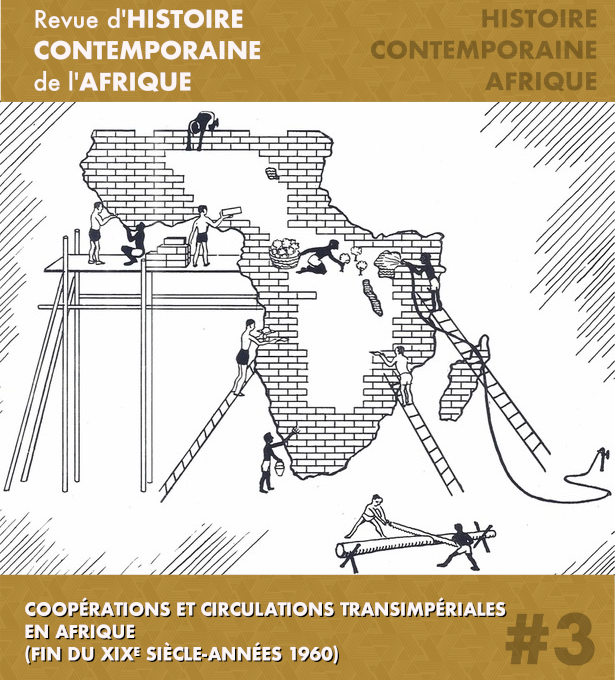Imperialism and Japan’s Colonial Immersion in Cameroon under French domination (1933-1960)
DOI:
https://doi.org/10.51185/journals/rhca.2022.0310Keywords:
Imperialism, colonial economy, commerce, Japan, CameroonAbstract
This article focuses on the Japanese imperial policy in Africa. What processes permitted this country to integrate and influence the Cameroonian colonial world? This contribution particularly focuses on the dynamics of transimperial commercial relations under both the League of Nations mandate and the UNO’s trusteeship, between 1933 and 1960. The deployment of companies financed or supported by the state and the private sector enabled Japan to posit itself as the first Asian country to have conducted significant economic and commercial activities in Cameroon at the climax of European imperial expansion. The Japanese participation to this economy also raises questions on its influence and its « responsibility » towards the colonized populations. Grounded in archival material from the Cameroonian archives, this article thus brings new elements highlighting a little-known aspect of the history of colonization in Africa and to consider new research perspectives in the history of this territory.
References
Aicardi de Saint-Paul Marc (1995), « Le Japon, Taiwan et l’Afrique du Sud », Afrique contemporaine, 176, n° spécial « Afrique-Asie », pp. 42-58.
Aicardi de Saint-Paul Marc (1999), Le Japon et l’Afrique : genèse d’une relation atypique, Paris, CHEAM.
Aicardi de Saint-Paul Marc (2010), « Japon-Afrique : genèse d’une relation pérenne », Géostratégiques, 26(1), pp. 181-197.
Atangana Martin (2009), French Investment in colonial Cameroon. The FIDES Era (1946-1957), New York, Peter Lang Publishing.
Barth Henri (1857), Travels and discoveries North and Central in Africa, chap. XLVI, Washington, Smithsonian Libraries.
Deltombe Thomas et al. (2012), Kamerun ! Une guerre cachée aux origines de la françafrique, Paris, La Découverte.
Democratic Party (1982), Policy Affairs Economic Cooperation, Tokyo, Ministry of Foreign Affairs.
Elenga-Ngaporo Joseph (2004), Le Japon, l’Asie et l’Afrique. Pour une Afrique performante, Paris, Silex/ Nouvelles du Sud.
Etoga Eily Florent (1971), Sur les chemins du développement : essai d’histoire des faits économiques du Cameroun, Yaoundé, Centre d’édition et de production de manuels et d’auxiliaires de l’enseignement.
Eyelom Franklin (2003), Le partage du Cameroun entre la France et l’Angleterre, Paris, L’Harmattan.
Herail Francine (1986), Histoire du Japon des origines à Meiji, Paris, Publications orientales de France.
Joyaux François (1993), La politique extérieure du Japon, Paris, PUF (« Que sais-je ? »).
Kitagawa Katsuhiko (1993), « Japan’s Economic Relations with South Africa in the Post-War Period: Determinants of Japanese Perceptions and Policies Towards South Africa », RECSAK, 9302, Kyoto, pp. 7-23.
Lumumba-Kasongo Tukumbi (2010), Japan-Africa relations, New York, Palgrave Macmillan.
Matsunuma Miho (2019), « Le Japon humilié à la conférence de paix de 1919 », Le Monde diplomatique, 778.
Mbabia Olivier (2021), La Chine en Afrique : histoire, géopolitique et géoéconomie, Paris, Ellipses.
Meke Biwolé (1989), Les relations commerciales entre le Japon et le Cameroun : 1960-1987, thèse de doctorat de 3e cycle en relations internationales, IRIC, Université de Yaoundé II.
Morikawa Jun (1985), « The myth and reality of Japan’s relations with colonial Africa 1885-1960 », Journal of African Studies, 12(1), Los Angeles, UCLA, pp. 39-46.
Mveng Engelbert (1985), Histoire du Cameroun (tome 2), Yaoundé, CEPER.
Ndam Njoya Adamou (1972), Le Cameroun dans les relations internationales, Paris, LGDJ.
Ngoh Victor Julius (1990), Cameroun 1885-1985, cent ans d’histoire, Yaoundé, CEPER.
Osterhammel Jürgen (2010), « “Colonialisme” et “Empires coloniaux” », Labyrinthe, 35(2). En ligne, consulté le 30 août 2022. URL : http://journals.openedition.org/labyrinthe/4083.
Purtschert Patricia et Fischer-Tiné Harald (dir.) (2015), Colonial Switzerland. Rethinking Colonial from the Margins, New York, Palgrave Macmillan
Reischauer O. Edwin (1973), Histoire du Japon et des Japonais. Des origines à 1945, Paris, Seuil.
Research Bureau of the Economic Planning Agency (1964), Economic Statistics of Japan, Tokyo, Shiseido.
Ségéric Jean-José (2013), Le Japon militaire, Paris, L’Harmattan.
Sono Themba (1993), Japan and Africa. The Evolution and Nature of Political Economic and Human Bonds, 1543-1993, Pretoria, HSRC.
Souleymanou Amadou (2020), Les présences japonaises et chinoises au Cameroun : enjeux, stratégies et dynamique (1933-2011), thèse de doctorat en histoire des relations internationales, Université de Ngaoundéré.
Souyri Pierre-François (2003), « La colonisation japonaise : un colonialisme moderne, mais non occidental », in M. Ferro (éd.), Le livre noir du colonialisme. XVIe-XXIe siècle : de l’extermination à la repentance, Paris, Robert Laffont, pp. 407-431.
Wolf (1923), Tropenflanzer, 2, pp. 38-48.
Downloads
Published
How to Cite
Issue
Section
License
Some rights reserved 2022 Amadou Souleymanou

This work is licensed under a Creative Commons Attribution-NonCommercial 4.0 International License.








